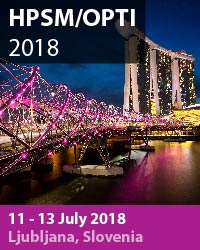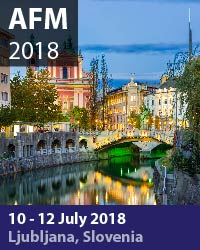The 2018 International Conference on High Performance and Optimum Design of Structures and Materials
11 - 13 July, 2018
Ljubljana, Slovenia
Overview

The 2018 International Conference on High Performance and Optimum Design of Structures and Materials took place in Ljubljana, Slovenia. The meeting was organised by the Wessex Institute, UK and the University of A Coruña, both represented by Prof Santiago Hernandez; the University of Maribor, Slovenia, represented by Prof Stojan Kravanja; and the Free University of Brussels, Belgium represented by Prof W. Patrick De Wilde, who is also a member of WIT’s Board of Directors.
The meeting followed the success of a series of conferences on Structures and Materials and their Optimum Design that started in Southampton as long ago as 1989. As the meetings evolved they gave rise to the current series, which started in Seville in 2002, followed by Ancona (2004), Ostend (2006), the Algarve (2008), Tallinn (2010), the New Forest, home of the Wessex Institute (2012), Ostend (2014) and Siena (2016).
The conference addressed issues involving advanced types of structures, particularly those based on new concepts or new materials and their system design. Contributions highlighted the latest development in design, optimisation, manufacturing and experimentation in those areas. The meeting also aimed to find higher performance sustainable materials.
Opening of the Conference
The meeting was opened by Professor Stojan Kravanja from the University of Maribor who welcomed the attendees to Slovenia and specifically to Ljubljana, and by Prof W. Patrick De Wilde, who described the work of the Wessex Institute which is committed through its series of conferences and courses to provide an interchange of information and the development of joint projects and networks.
Following this Prof Patrick De Wilde gave a tribute to the founder of the Wessex Institute, the late Prof Carlos A Brebbia, who died earlier this year.
Keynote Address
The technical part of the conference started with a Keynote Address from Prof. Stojan Kravanja entitled “The MINLP optimization of structures”.
Invited Speakers
This was followed by a series of invited addresses given by well-known researchers, which enhanced the conference:
- “Synthesis and optimization of engineering systems” by Milos Bogataj, University of Maribor, Slovenia.
- “A 2.1GPa triple-phase spring steel” by Derek Northwood, University of Windsor, Canada.
- “Optimization of high-performance concrete post-tensioned box-girder pedestrian bridges” by Victor Yepes, Polytechnic University of Valencia, Spain.
- “Evaluation of tensile strength of glass from combined experimental and numerical analysis of laminated glass” by Michal Sejnoha, Czech Technical University, Czech Republic.
- “Characterisation of epoxy nanocomposites reinforced by potassium titanate whisker” by Hitoshi Takagi, Tokushima University, Japan.
- “Experiences on structural optimization under uncertainty in aerospace components” by Aitor Baldomir, University of A Coruña, Spain.
Conference Sessions
The papers presented at the meeting covered a wide variety of topics, grouped under the following themes:
- Design optimisation in engineering
- Materials characterisation
- Composite materials
- Bridge optimisation
- Sustainable approaches
- Structural optimisation
- Size and topology optimisation
Conference Publication
Papers presented at this conference will appear in Vol 175 of the WIT Transactions on Ecology and the Environment (ISSN1743-3541). All papers presented at the meeting are now available Open Access in the eLibrary of the Wessex Institute (https://www.witpress.com/elibrary) from where they can be freely downloaded.
A few papers have been selected for publication in the International Journal of Computational Methods and Experimental Measurements. The objective of this Journal is to provide the scientific community with a forum to present papers on the interaction and complementary aspects of computational methods and experimental measurements, and stress the importance of their harmonious development and integration.
ISAC Dinner
The International Scientific Advisory Committee (ISAC) of the Conference met over dinner to discuss new topics for the Conference and ways in which the meeting could be improved when it is reconvened. Several new topics were proposed as well as the manner in which the conference should evolve. Nominations were made for the ISAC and a discussion took place regarding the most suitable location for the next conference. The meeting was closed by the Chairmen expressing their gratitude to the committee members for their help in reviewing the conference papers and promoting the meeting.
Conference Dinner
The Conference Dinner took place in the Atelje restaurant which is famous for its sophisticated and creative cuisine. During the dinner, Professor Kravanja gave a speech about the many artistic places of Ljubljana and mentioned some of the architects and engineers responsible for their design.
Closing of the Conference
The Conference was closed by Patrick de Wilde and Stojan Kravanja who thanked the delegates for coming and hoped that they would attend other WIT Conferences.
Related Conferences
BEM/MRM 41, 11 - 13 September 2018
Materials Characterisation 2019, 22 – 24 May 2019
CMEM 2019, 3 – 5 June 2019
ERES 2019, 5 - 7 June 2019
STREMAH 2019, 7 – 9 October 2019
